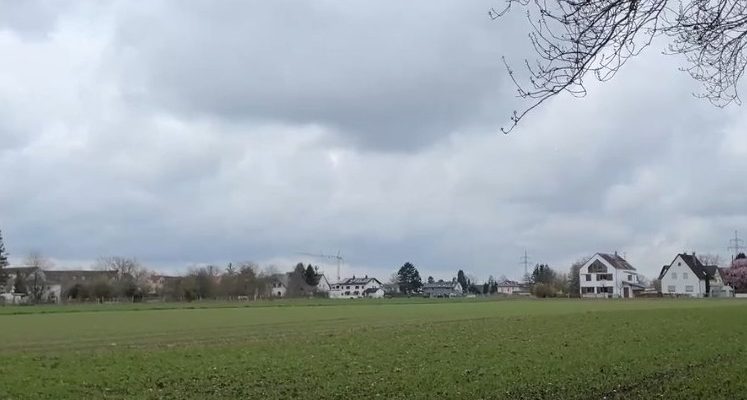The planned construction of refugee accommodation on a meadow between Stummerstrasse and Servetstrasse is still encountering resistance in Allach-Untermenzing. On Tuesday evening, a good 200 people responded to the call by the “Allach Living” citizens’ initiative and came to the district committee meeting to protest against the sealing of the meadow, which was considered an important fresh air corridor and infiltration area. It was not the first rebellion: criticism of the project had already been voiced in the March meeting.
Despite the shortage of space and housing, Munich has to provide 5,625 places for refugees, which is the Herculean task of the municipality, based on a distribution key, 4,500 of which should be usable in the medium to long term. As a result, according to Gerhard Mayer, head of the Office for Housing and Migration on Tuesday evening, “we have to create at least 20 locations”. It is the task of a cross-departmental task force to determine this. “More than 160 locations have already been checked since 2022,” explained Mayer. “Existing buildings, prospective land, green areas, everything is examined.” Green spaces are only possible with settlement connections. “We’re already trying to be considerate of the neighbors,” assured the head of the office. “Unfortunately, this is not always possible due to a lack of sufficient space.”
According to the current location decision, accommodation for around 290 people seeking protection is planned on the green area on Servetstrasse. A modular building complex in wood frame construction with wood paneling, maximum ten meters high, with a distance of 30 meters to the neighboring buildings. And with 24-hour care, five full-time positions are calculated for this. Duration of the house “for cost reasons”: ten years. “We’ll take a closer look at the height,” emphasized Mayer. “Maybe instead of the ground floor and two more floors, we’ll just do an upper floor.”
However, the use of the meadow itself is “unavoidable” due to the pressure of having to accommodate people. Alternative locations already proposed by the district committee and citizens at the Allach cemetery, at Krauss-Maffei or on the site of the former Allach summer pool have already been examined, says Mayer, and they are all out of the question. “Either there is no settlement connection, the emissions are too high or, as with the bathroom, there are local recreation and therefore taboo zones.”
Many Allach residents, on the other hand, are wondering whether the environmental impact was also assessed in all of this? “This area on Servetstrasse is unsuitable, Allach is already glowing,” said the spokesman for the initiative, Peter Ziegler, in justifying the criticism of the municipal project. Addressing politicians, he asked: “Will you accept the referendum on green space preservation – or do you want to keep burning this city?”
Not all speeches remained relevant in the BA session
A direct neighbor of the Wiese argued that during the renovation of the Allach Tunnel, during which the traffic was particularly busy in the district, this fresh air aisle should now also be closed. “That’s why we demand pollutant measurements on the Mariensäule on Eversbuschstrasse.” Others referred to the “quality of life” and the “interests of the residents” that should be preserved. The whole thing, Mayer explained, is a “classic conflict of goals: We have to weigh up the use of the green space against the accommodation for the refugees.”
Not all speeches remained factual. The dismantling was “a fairy tale hour,” said a resident to applause, and the “allocation rate” had to be checked. Finally, she also provocatively asked whether “here, like in East Germany, a refugee shelter has to burn first” before politicians react. There were tumultuous scenes, supporters of the accommodation saw the sentence as a threat, whereupon AfD city councilor Daniel Stanke threatened them with criminal prosecution for insult.
One group accused “the Allach citizenship” of only faking the green protection, but in reality rejecting the asylum seekers. Because a participant in this group repeatedly shouted loudly, head of the committee Pascal Fuckerieder (SPD) referred her to the hall after repeated rebukes – in order to calm things down again. The fact that the chairman had initially suggested a speaking time of two minutes in view of the influx of visitors was chalked up to him by an Allacher as an “undemocratic sleight of hand”.
“One of our points of criticism is that politics and administration completely ignore us,” complained citizen initiative spokesman Ziegler. The citizens’ initiative formulated a four-page catalog of questions in small print that has not yet been answered. City Councilor Anna Hanusch (Greens) promised to provide the information and to examine the objections. However, the planning continued until the decisive financing and implementation decision was taken in September. “We are in the midst of very difficult coordination processes, which we certainly do not take lightly,” she stressed. “A municipality as large as Munich cannot simply duck away when it comes to housing refugees.”
It is currently planned to start construction of the house on Servetstrasse in mid-2024, so that the residents can move in a year later. The citizens’ initiative announced a citizens’ initiative against the project.

